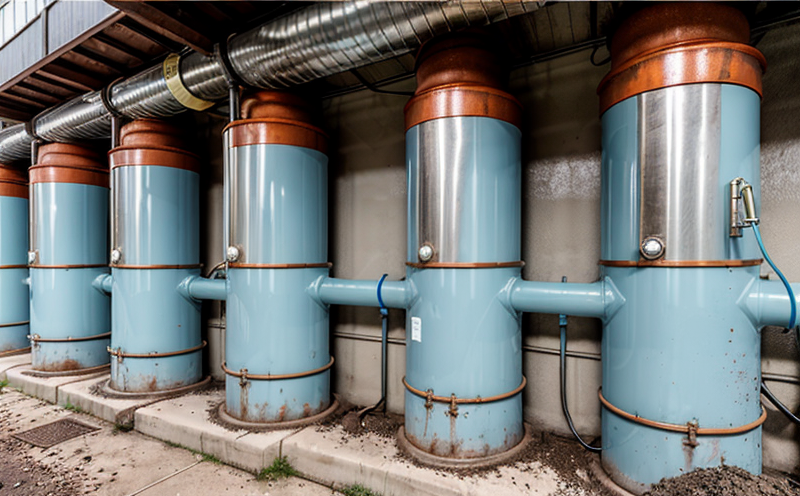ASTM D516 Sulfate Ion Test in Water Systems
The ASTM D516 sulfate ion test is a critical procedure used to measure the concentration of sulfate ions (SO₄²⁻) in water systems. This test is essential for understanding the chemical composition and potential risks associated with high levels of sulfate in various applications, including potable water, industrial processes, and wastewater treatment.
Sulfate ions are naturally present in groundwater and surface waters due to their widespread occurrence in nature as a byproduct of natural weathering processes. In certain environments, sulfate can be converted into hydrogen sulfide (H₂S) under anaerobic conditions, leading to corrosion issues in water systems. Elevated levels of sulfate can also contribute to scaling and deposition within pipes and equipment, affecting the efficiency and longevity of these components.
The ASTM D516 procedure utilizes a colorimetric method based on the reaction between vanadomolybdate reagents and phosphate ions present in the sample. This results in a blue or green complexation product whose intensity is proportional to the sulfate concentration. The test provides accurate quantification of sulfate ion content, typically ranging from 0.1 mg/L up to several hundred milligrams per liter.
The importance of this test cannot be overstated for industries that rely heavily on water quality assurance and control. For instance, potable water suppliers must ensure compliance with local regulations regarding sulfate limits to protect public health. In industrial settings, monitoring sulfate levels helps prevent costly equipment failures caused by corrosion or scaling. Additionally, wastewater treatment plants need accurate sulfate data to optimize their processes and meet discharge standards.
Proper specimen preparation is crucial for obtaining reliable results from the ASTM D516 test. Samples should be collected using appropriate containers designed to minimize contamination. Properly labeled samples must then undergo thorough filtration before analysis to remove any particulate matter that could interfere with accurate measurement. It’s also important to store samples at a consistent temperature and protect them from light exposure until testing is complete.
Understanding the implications of sulfate ion presence in water systems goes beyond just laboratory measurements; it has real-world applications across multiple sectors. For example, drinking water utilities use ASTM D516 results to set treatment targets aimed at reducing unwanted sulfate levels while maintaining other essential parameters like pH and turbidity within safe ranges.
In industrial settings where cooling towers or boiler feedwater systems operate, knowledge of sulfate concentrations allows engineers to implement preventive maintenance strategies designed specifically for combating corrosion risks. Similarly, in wastewater management facilities, accurate sulfate data informs decisions about tertiary treatment methods needed to achieve stringent effluent quality targets.
- Enhances water treatment effectiveness
- Promotes efficient industrial operations
- Aids in meeting regulatory requirements
- Supports sustainable environmental practices
- Reduces operational costs through informed decision-making
- Maintains product quality standards across industries
The ASTM D516 sulfate ion test plays a pivotal role in safeguarding water systems against potential hazards posed by excessive sulfate levels. By providing precise quantitative data, this method enables stakeholders to make well-informed choices about how best to manage their water resources.
Scope and Methodology
The ASTM D516 test focuses specifically on determining the total concentration of sulfate ions in water samples. This includes both dissolved sulfate (SO₄²⁻) as well as any bound forms that may be present within particulate matter.
To perform the ASTM D516 sulfate ion test, a standardized colorimetric procedure is followed which involves several steps:
- Sample collection using appropriate containers
- Filtration of samples to remove suspended particles
- Dilution if necessary based on preliminary analysis
- Addition of reagents including vanadomolybdate and phosphoric acid
- Incubation period allowing for chemical reactions to occur
- Comparison against standard solutions using a spectrophotometer
The method allows for determination over an extended range, usually between 0.1 mg/L up to several hundred milligrams per liter depending on the specific requirements of the application.
Acceptance criteria specify that results must fall within defined limits set forth by relevant regulatory bodies or industry standards. For example, in potable water supplies, permissible sulfate levels might be capped at around 250 mg/L according to World Health Organization guidelines. Exceeding these thresholds could indicate issues such as contamination from upstream sources or poor quality raw materials used during purification processes.
By adhering strictly to the ASTM D516 procedure, laboratories ensure consistent and accurate measurement results that can be relied upon by clients across diverse industries. The use of internationally recognized standards like ASTM ensures credibility and repeatability of findings even when conducted at different locations worldwide.
Eurolab Advantages
At Eurolab, we pride ourselves on offering comprehensive water testing services tailored to meet the unique needs of our clients across various sectors. Our expertise in performing ASTM D516 sulfate ion tests is complemented by state-of-the-art facilities equipped with advanced analytical instrumentation capable of delivering precise and reliable results.
Our team of highly skilled professionals possesses extensive experience in conducting complex water chemistry analyses, ensuring accurate interpretation of data obtained from the ASTM D516 test. We employ stringent quality control measures throughout every step of our testing process to minimize errors and ensure consistent outcomes.
We understand that timely delivery is crucial for many of our clients; therefore, we strive to provide rapid turnaround times without compromising on accuracy or precision. Clients can expect quick access to their test reports via secure online platforms where all relevant information is made readily available within days after submission.
Our commitment to excellence extends beyond just technical proficiency; it encompasses ongoing education and staying abreast of emerging trends in the field of water quality management. By continuously investing in research and development, Eurolab remains at the forefront of innovation when it comes to developing new methods for addressing challenges faced by our clients.
In addition to offering ASTM D516 sulfate ion testing services, we also provide a wide array of other water-related tests including microbiological assessments, heavy metal analysis, organic compound detection, and more. This diverse portfolio allows us to address all aspects related to water quality assurance effectively and efficiently.





